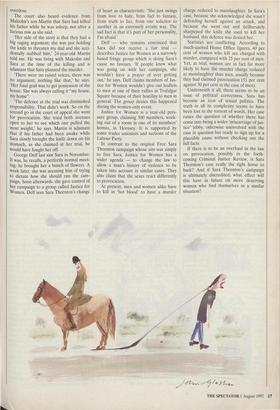AN ICON OF SEXUAL POLITICS
Richard Pendry argues that the
campaign to release a murderess has more to do with feminism than justice
SARA THORNTON'S trial in 1990 attracted little interest from those not immediately affected by the killing of her husband Malcolm, who had died from a single, deep wound from her carving-knife. Local reporters regarded it as a run-of-the- mill domestic killing: the verdict — guilty of murder — only rated a brief mention in a single national newspaper.
But when, a year ago this week, her appeal was turned down and Sara began a hunger strike, protesting that the law failed to take into account the violence she had suffered at the hands of her alcoholic husband, the response of the media was overwhelming. She started the hunger strike, she said, because Joseph McGrail, who had killed his 'nagging' wife, had that week walked free from a court with a two- year suspended sentence.
Sara Thornton's case seemed clear-cut. She had married a man who she found out was an alcoholic. She had heroically strug- gled to rescue him from his alcoholism. Yet he beat her up and threatened to kill Sara and her then 11-year-old daughter, Luise. Finally, after a fearsome row, she `snapped', and plunged the knife six inches into his stomach. Three hours later, he died.
The apparent contrast was irresistible to news editors and columnists alike. The McGrail case had, after all, shown that there was one law for women in fear of their lives who killed their husbands, and another for the wife-killers. It also coincid- ed with growing disenchantment with the criminal justice system in the wake of the successful appeals by the Birmingham Six, Maguire Seven and Guildford Four.
Most importantly for the media, George Delf, the man who fell in love with Sara after visiting her in prison and who had set up the Free Sara Thornton campaign, had a background in journalism and was accomplished at handling the media. He seemed to be always on the other end of the phone in his home in Durham, ready to give Sara's side of events.
It was a tabloid love story, Delf playing Jill Morrell to Sara's John McCarthy. Sara was 35 years old and attractive; Delf was older, softly spoken and sincere. The case had a new, almost glamorous angle. George wrote to Sara nearly every day for a year and four months.
But less than a year later, he now admits he 'over-simplified' the case in order to maximise media coverage, and he is very critical of the direction her campaign has taken.
A close look at the transcript of the trial — which, as far as I know, no other jour- nalist has seen — together with what some of the people closest to Sara before the murder have to say, raises uncomfortable questions for her supporters, among them many MPs, lawyers and other right-think- ing members of the liberal establishment.
Unlike most pressure groups campaign- ing against apparent miscarriages of jus- tice, Sara's own family has had nothing to `Red sky at night, ghetto's alight.' do with the lobbying which has gone on on her behalf. In fact, no one who knew Sara before the murder has supported her efforts to be freed. Last week her father, who did not attend her trial and has dis- tanced himself from Sara's campaign, said that her supporters have never been in touch with him to verify any of the state- ments made about her. For example, some of her campaigners have talked of 'years of physical and mental torture'; but the cou- ple were only married for nine months, having lived together for the previous ten.
Some of the evidence heard at Sara's trial, not dwelled on by her campaigners, is startlingly at odds with the current percep- tion of her case. According to the prosecu- tion: *Malcolm had told Sara he wanted a divorce the day he was killed.
*She was afraid she would lose out finan- cially if Malcolm was divorced, and that she was obsessed with gaining his house and money coming to him from a previous job in Saudi Arabia.
*Four days before the murder, Sara told a colleague she was going to kill her hus- band, that she was not prepared to lose everything.
*The following day, she hand-fed him tran- quillisers hidden in pieces of chicken while he was in the bath, then phoned the doctor to say he was suicidal and had taken an overdose.
The court also heard evidence from Malcolm's son Martin that Sara had killed his father while he was asleep, not after a furious row as she said.
`Her side of the story is that they had a big raging argument; she was just holding the knife to threaten my dad and she acci- dentally stabbed him,' 24-year-old Martin told me. He was living with Malcolm and Sara at the time of the killing and is adamant that Sara planned the murder.
`There were no raised voices, there was no argument, nothing like that,' he says. `Her final goal was to get possession of the house. She was always calling it "my house, my home".
The defence at the trial was diminished responsibility. That didn't work. So on the second go in the court of appeal she went for provocation. She tried both avenues open to her to see which one pulled the most weight,' he says. Martin is adamant that if his father had been awake while Sara slowly brought the knife down on his stomach, as she claimed at her trial, he would have fought her off. George Delf last saw Sara in November. It was, he recalls, a perfectly normal meet- ing; he brought her a bunch of flowers. A week later, she was accusing him of trying to dictate how she should run the cam- paign. Soon afterwards. she gave control of her campaign to a group called Justice for Women. Delf sees Sara Thornton's change of heart as characteristic: 'She just swings from love to hate, from fact to fantasy, from truth to lies, from one solicitor to another in an extremely erratic way. The sad fact is that it's part of her personality, I'm afraid.'
DeIf — who remains convinced that Sara did not receive a fair trial describes Justice for Women as a narrowly based fringe group which is doing Sara's cause no favours. 'If people knew what was going on with her campaign, she wouldn't have a prayer of ever getting out,' he says. DeIf claims members of Jus- tice for Women wouldn't give out leaflets to men at one of their rallies in Trafalgar Square because of their hostility to men in general. The group denies this happened during the women-only event.
Justice for Women is a year-old pres- sure group, claiming 500 members, work- ing out of a room in one of its members' homes, in Hornsey. It is supported by some trades unionists and sections of the Labour Party.
In contrast to the original Free Sara Thornton campaign whose aim was simply to free Sara, Justice for Women has a wider agenda — to change the law to allow a man's history of violence to be taken into account in similar cases. They also claim that the sexes react differently to provocation.
At present, men and women alike have to kill in 'hot blood' to have a murder charge reduced to manslaughter. In Sara's case, because she acknowledged she wasn't defending herself against an attack, and because she went out and deliberately sharpened the knife she used to kill her husband, this defence was denied her.
Statistics are conflicting. According to much-quoted Home Office figures, 40 per cent of women who kill are charged with murder, compared with 25 per cent of men. Yet, at trial, women are in fact far more likely to have the murder charge reduced to manslaughter than men, usually because they had claimed provocation (51 per cent against 30 per cent in the case of men). Underneath it all, there seems to be an issue of political correctness. Sara has become an icon of sexual politics. The truth in all its complexity seems to have been lost in the torrent of words. Her case raises the question of whether there has come into being a wider 'miscarriage of jus- tice' lobby, otherwise uninvolved with the case in question but ready to sign up for a plausible cause without checking out the full facts.
If there is to be an overhaul in the law on provocation, possibly in the forth- coming Criminal Justice Review, is Sara Thornton's case really the right horse to back? And if Sara Thornton's campaign is ultimately discredited, what effect will this have in future on more deserving women who find themselves in a similar situation?



















































 Previous page
Previous page